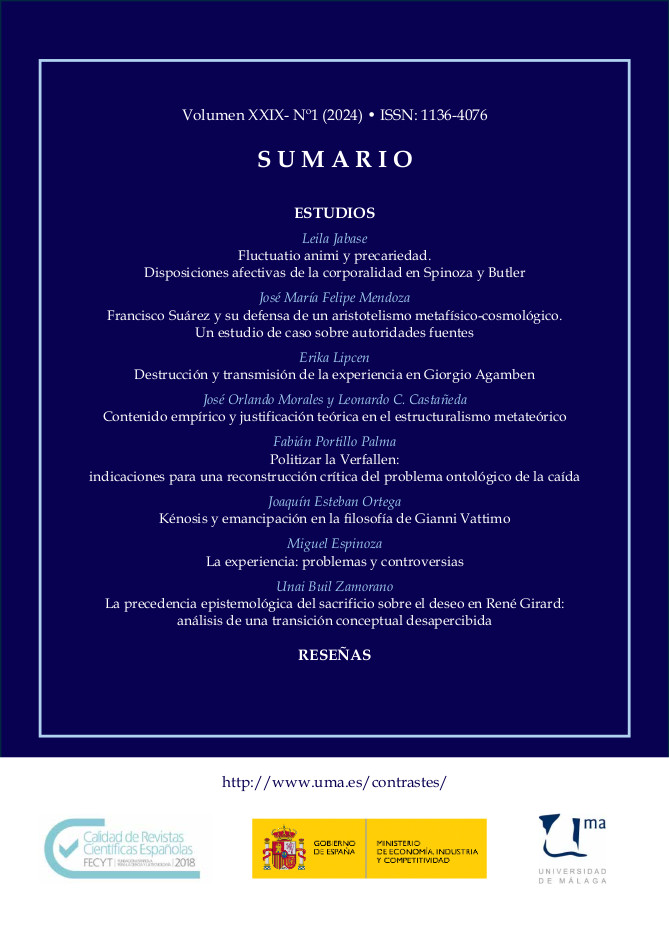Kenosis and emancipation in the philosophy of Gianni Vattimo
DOI:
https://doi.org/10.24310/contrastes.29.1.2024.16411Keywords:
Kénosis, Truth, Pensiero debole, Hermeneutics, EmancipationAbstract
The aim of this article is to relate the notion of kenosis, on which Gianni Vattimo's hermeneutic conception of religion is essentially based, with the emancipatory pretension that arises from hermeneutic nihilism. In order to do so, we will trace this hermeneutic conception of truth that no longer violates us, on the basis of which the religion of pensiero debole is structured. Moreover, we will see how the hermeneutic conception of metaphysics, apart from presenting itself as the key to secularisation, will allow us to identify salvation with interpretation. On these general presuppositions of his philosophy, Vattimo announces the coming of Jesus as a hermeneutic phenomenon. Finally, we will have to ask ourselves whether the possibilities of this tragic approach to kenosis are taken to their ultimate consequences with the socio-political announcement of an emancipation of a hermeneutical nature.
Downloads
Metrics
Publication Facts
Reviewer profiles N/A
Author statements
Indexed in
-
—
- Academic society
- N/A
- Publisher
- Universidad de Málaga
References
GADAMER, H.-G. (1975). Verdad y método. Fundamentos de una hermenéutica filosófica. Salamanca: Sígueme.
HERIBAN, J. (1983). Retto 'fronein e kénosis'. Studio esegetico su Fil. 2, 1-5. 6-11-. Roma: Las.
LOZANO PINO, J. y OÑATE Y ZUBÍA, T. (2015). El amor es el límite: reflexiones sobre el cristianismo hermenéutico de G. Vattimo y sus consecuencias teológico-políticas. Madrid: Dykinson.
NAVARRO CUERVO, H, (1996). «La Kenosis de Cristo: Estudio exegético y teológico de Filipenses 2, 6-11. El desprendimiento solidario de Jesús, un autodespojo que enriquece al hombre», Mayéutica, XXII, 54, pp. 339-436.
NÚÑEZ MORENO, J. M. (1999) «Ontología débil, secularización y hermenéutica en G. Vattimo. Algunas claves interpretativas del entorno de la religión en la tarda modernidad» Isidorianum, VIII, 16, pp. 531-562
OLIVEIRA GOMES, J., PEREIRA PINTO, A. J. (2021). «Gianni Vattimo: religião e secularização na pós-modernidade», Analysis: claves de pensamiento contemporáneo, XXVIII, 28, pp. 29-39.
OÑATE, T. (1996), «Introducción», Gianni Vattimo, La sociedad transparente. Barcelona: Paidós, pp. 9-55.
OÑATE, T. (2000), El retorno griego de lo divino en la postmodernidad. Una discusión con la hermenéutica nihilista de Gianni Vattimo. Madrid: Aldebarán.
QUINTANA PAZ, M. Á. (2003), «Los dioses han cambiado (de modo que todo lo demás ya podría cambiar): acotaciones en torno a la contribución de la hermenéutica de Gianni Vattimo a la condición religiosa postmoderna», Azafea: revista de filosofía, 5, pp. 237-259.
QUINTANA PAZ, M. Á. (2022), «Gianni Vattimo o la secularización truncada», ¿Atenas y Jerusalén?: política, filosofía y religión desde 1945. Jorge del Palacio Martín, Guillermo Graíño Ferrer (Coords.). Madrid: Tecnos, pp. 417-432
QUINTANAS FEIXAS, A. (2008). «La ontología de la actualidad de G. Vattimo: una filosofía entre la religión y la política», A Parte Rei: revista de filosofía, 60.
ROLDÁN, A. F. (2007). «La kénosis de Dios en la interpretación de Gianni Vattimo: hermenéutica después de la Cristiandad», Teología y cultura, VII, 4, pp. 83-95.
RORTY, R. y VATTIMO, G. (2006), El futuro de la religión. Solidaridad, caridad e ironía. Barcelona: Paidós.
SCILIRONI, C. (1997), «La filosofía laica italiana interprete del cristianesimo», Studia Pavatina, XLIV, 2, pp. 31-60.
VATTIMO, G. (1992), «Metafísica, violencia, secularización», en La secularización de la filosofía. Hermenéutica y posmodernidad. Barcelona: Gedisa, pp. 63-88.
VATTIMO, G. (1995), Más allá de la interpretación, Barcelona: Paidós.
VATTIMO, G. (1996a), «Historia de la salvación, historia de la interpretación», en Filosofía, Política, Religión. Más allá del «pensamiento débil», Oviedo: Nobel.
VATTIMO, G. (1996b), «La huella de la huella», en J. Derrida, y G. Vattimo (eds.), La religión. Madrid: PPC.
VATTIMO, G. (1996c), Creer que se cree. Barcelona: Paidós.
VATTIMO, G. (1996d), Credere di credere. Garzanti: Milano.
VATTIMO, G. (2002), Dopo la cristianità. Per un cristianesimo non religioso. Milano: Garzanti.
VATTIMO, G. (2003), Nichilismo ed emancipazione. Etica, politica, diritto. Milano: Garzanti.
VATTIMO, G. (2004), Después de la cristiandad. Por un cristianismo no religioso. Barcelona: Paidós.
VATTIMO, G. (2004b), Nihilismo y emancipación. Ética, política, derecho. Barcelona: Paidós.
VATTIMO, G., ONFRAY, M. y FLORES D’ARCAIS, P. (2009), ¿Ateos o creyentes? Barcelona: Paidós.
Downloads
Published
How to Cite
Issue
Section
License
This journal provides immediate free access to its content under the principle of making research freely available to the public. All content published in Contrastes. Revista Internacional de Filosofía, are subject to the Creative Commons Attribution-NonCommercial-ShareAlike 4.0 license whose full text can be found at <http://creativecommons.org/licenses/by-nc-sa/4.0>
It is the responsibility of the authors to obtain the necessary permissions of the images that are subject to copyright.
Authors whose contributions are accepted for publication in this journal will retain the non-exclusive right to use their contributions for academic, research and educational purposes, including self-archiving or repository in open access repositories of any kind.
The electronic edition of this magazine is edited by the Editorial Service of the University of Malaga (Uma Editorial), being necessary to cite the origin in any partial or total reproduction.










5.png)
